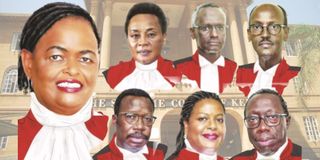
Chief Justice Martha Koome (left), Deputy Chief Justice Philomena Mwilu (top), Justices Isaac Lenaola and Ibrahim Mohamed. (Bottom row) Justices Smokin Wanjala, Njoki Ndung'u and William Ouko.
Deputy Chief Justice Philomena Mwilu and Supreme Court judge Mohammed Ibrahim have won the first round against the Judicial Service Commission in relation to their proposed removal from office over alleged misconduct.
At the same time, the two petitions have been forwarded to Chief Justice Martha Koome for appointment of an expanded bench to hear and determine the legal dispute surrounding the ouster of apex judges.
This development also benefits chief Justice Martha Koome, justices Smokin Wanjala, Isaac Lenaola, Njoki Ndung'u and William Ouko who are also facing similar ouster proceedings.
High Court Judge Bahati Mwamuye on Thursday rejected a call from lawyer Nelson Havi, who is one of the proponents of the ouster, to strike out their petitions challenging the JSC disciplinary proceedings.

Former Law Society of Kenya president Nelson Havi.
The judge told Mr Havi and JSC that the Constitution did not shield the actions of the commission from being challenged in court. It was within Ms Mwilu and Mr Ibrahim’s constitutional rights to seek the court’s intervention before the conclusion of the ouster process, the judge ruled.
“Had the Constitution intended to immunise the JSC proceedings, the same would have been stated expressly in the Constitution. There is no express ouster clause against the court intervention. So JSC falls under the bodies that can be supervised by the High Court,” said Justice Mwamuye.
The judge also ordered that the twin files be forwarded to the Chief Justice for assignment to an expanded bench.
The judge found that the petitioners (Mwilu and Ibrahim) have raised substantial questions of law relating to removal of Supreme Court judges from office.
Among the key questions the expanded bench will handle is the constitutionality of the complaints filed at the JSC against all the Supreme Court judges jointly.
Justice Mwamuye said: “The petitions deserve multi-judge decision, both are certified as raising substantial issues of law pursuant to Article 165(4) of Constitution and are referred to the Chief Justice for empanelment of the bench”.
Court's intervention
Ms Mwilu and Mr Ibrahim, together with the other five Supreme Court judges rushed to court separately in February after the JSC asked them to respond to their proposed removal from office.
They sought the court's intervention on various reasons, among them, the legitimacy of the complaints, processing of the same and legality of the JSC’s decision to ask them to file responses.
Ms Mwilu and Mr Ibrahim’s petitions were placed before, who also issued interim orders blocking any further proceedings before the JSC.

Justice Bahati Mwamuye during a court proceeding at Milimani Law Court on December 18, 2024.
One of the complainants, Mr Havi, countered the petitions with an objection stating that the High Court does not have powers to inquire into the conduct of the JSC.
He called on judge Mwamuye to strike out the cases, a request that was backed by the JSC, which argued that the judges were supposed to first submit themselves to the commission, not court.
However, Justice Mwamuye dismissed the objection and ruled that JSC was not immune to the supervisory powers of the High Court.
“The High Court has supervisory jurisdiction over the JSC, subordinate courts and over any person, body or authority exercising a judicial or quasi-judicial function. Removal proceedings of a superior judge from office are quasi-judicial. The JSC is not a superior court, hence it fits in the definition of other persons and bodies subject to supervisory jurisdiction of the court,” he ruled.
If actions of JSC were not under supervision of the High Court, the judge said that “the Constitution should have expressly stated that JSC is excluded from the supervisory jurisdiction of the High Court”.
On the locus standi of Supreme Court judges to sue their employer -JSC, Justice Mwamuye ruled that their move to court was legal as they were entitled to seek legal redress where the JSC had exercised its powers in a manner that was alleged to be inconsistent with the Constitution.
In his application, Mr Havi had argued that the issues raised by Ms Mwilu and Mr Ibrahim were exclusively a preserve of the JSC. He said the High Court had no competence to handle the matters.
Mr Havi explained that the Supreme judges should have moved to court after the JSC was done with the disciplinary process and initiate a challenge to the outcome of the proceedings.










